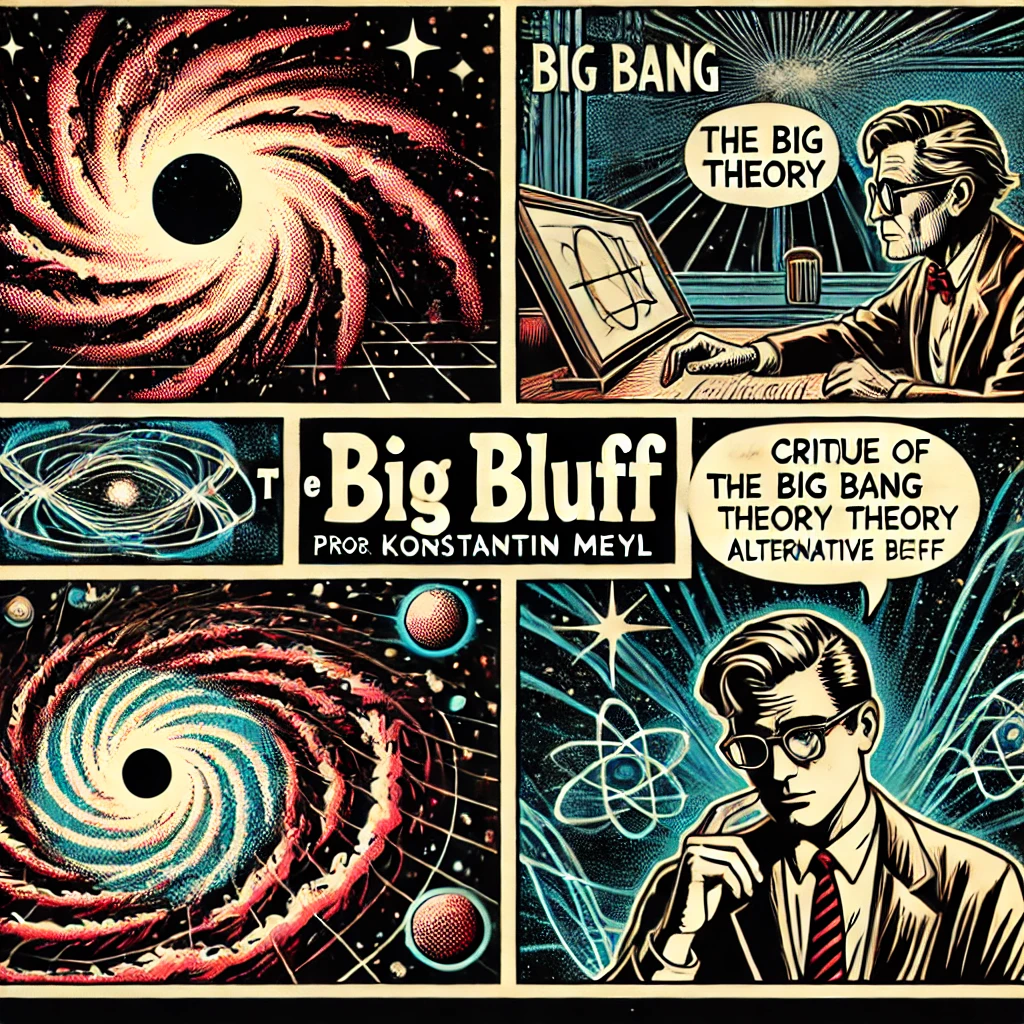Big Bang the Big Bluff Prof Konstantin Meyl
The Big Bang is alleged to be the starting point of our universe. This theory, originally proposed by a Jesuit astronomer, is based on the Doppler Effect. All galaxies except our own, the Milk Way, are through our telescopes observed with a “redshift”, which made some physicists conclude that all other galaxies are moving away from us, and thereby the universe is expanding. The original force causing the universe to expand, some contend, was termed the Big Bang.
Prof. Konstantin Meyl is convinced that the redshift of the other galaxies has another cause, which makes the Big Bang theory collapse. Meyl points out that everyone agrees all galaxies are slowly contracting towards their individual center, called a Black Hole. That means in our galaxy all the stars come closer to each other as they approach their Black Holes. That implies that we should see some stars having a blueshift, an increase in frequency as they near us. But blueshift is not observed.
The mistake Einstein and the modern quantum mechanics do is that they ignore the source field, the aether. The field is controlling matter and therefore the length of the meter. Speed is meter times seconds. Therefore the field controls even the speed, including the speed of light. We don’t see the blueshift at the fixed stars, because they and we belong to the same field of our galaxy. We all shift place in the same proportion. That’s also the reason why we measure the speed of light as a constant: 300,000 km / s. That measurement is only an illusion.
So Galileo was right in claiming that an object with the speed of light coming towards us should be quicker than light, because both speeds add up. Einstein claimed nothing is faster than light speed [this has since been disproved]. The source field remains hidden from us because we are within it.
Note that all “sides” in the “debate” over the “globe theory” were Catholic/Vatican/Jesuit controlled — Kepler, Copernicus, Brahe, Galileo. When one force controls all supposed polarities, that fulfills a prerequisite for mind-control / scope-of-thought-control via the Hegelian Dialectic. https://wp.4sci.org/2024/12/copernicus-kepler-brahe-galileo-all-major-big-banger-cosmologists-directly-connected-to-vatican-jesuits/
Konstantin Meyl is a German physicist known for his controversial theories and alternative interpretations of mainstream scientific concepts. One of his controversial claims is regarding the Big Bang theory, which he has criticized and referred to as the “Big Bluff.” Here’s a brief overview of Meyl’s perspective on the Big Bang:
1. Critique of the Big Bang Theory: Meyl challenges the widely accepted Big Bang theory, which posits that the universe originated from a singularity approximately 13.8 billion years ago and has been expanding ever since. He argues that the Big Bang theory is based on flawed assumptions and insufficient evidence, leading to inaccuracies and inconsistencies in cosmological models.
2. Alternative Cosmological Model: Instead of accepting the Big Bang theory, Meyl proposes alternative cosmological models that rely on different theoretical frameworks and interpretations of observational data. He suggests that the universe may be infinite and eternal, with no definitive beginning or end, contrary to the finite and expanding universe described by the Big Bang theory.
3. Electromagnetic Cosmology: Meyl’s alternative cosmological models often incorporate concepts from electromagnetism and field theory, which he believes offer a more comprehensive and accurate understanding of the universe’s structure and dynamics. He suggests that electromagnetic forces play a crucial role in cosmological processes, including the formation of galaxies, stars, and planetary systems.
4. Controversy and Criticism: Meyl’s critiques of the Big Bang theory and his alternative cosmological models have sparked controversy and skepticism within the scientific community. Many mainstream physicists and cosmologists reject Meyl’s ideas, citing the overwhelming evidence supporting the Big Bang theory and the lack of empirical support for Meyl’s alternative hypotheses.
5. Interdisciplinary Approach: Despite the criticism, Meyl continues to advocate for an interdisciplinary approach to cosmology that integrates insights from physics, mathematics, and other scientific disciplines. He emphasizes the importance of questioning established paradigms and exploring alternative explanations for observed phenomena, even if they challenge conventional wisdom.
In summary, Konstantin Meyl’s skepticism toward the Big Bang theory and his alternative cosmological models reflect his broader commitment to questioning orthodox scientific theories and exploring unconventional ideas. While his views remain controversial and subject to debate, they highlight the ongoing complexity and uncertainty inherent in our understanding of the universe’s origins and evolution.
